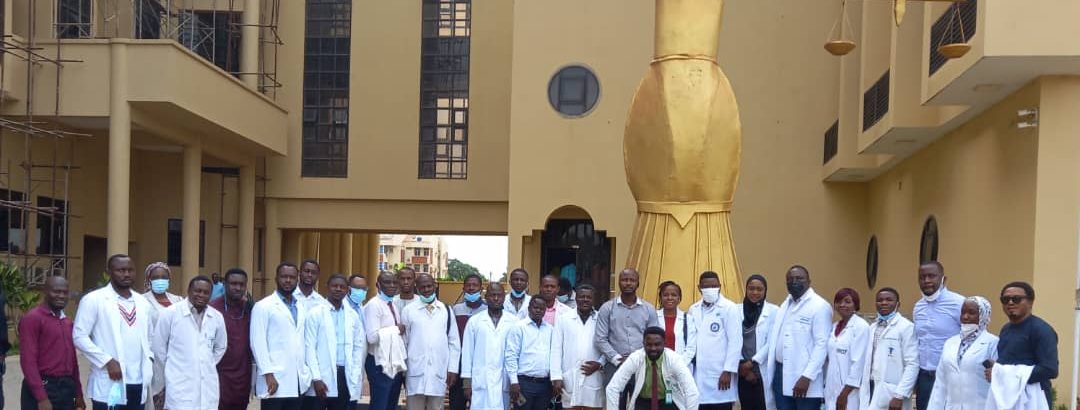In recent times, there have been uproars and concerns about leadership in the Nigerian health sector.
One of such case was the recent spotlight on the Abia State health system, where the new governor came in and started making numerous changes in the state including the health system. During which the governor appointed a commissioner of health (Ngozi Okoronkwo) who is noted to be a properly trained health administrator and health system strengthening expert – but with a background in Medical Rehabilitation and not a Medical Doctor as the case usually is. This “unusual occurrence in appointment” caused several takes and thoughts to emanate from different disciplines among healthcare professionals in the state.
Still on the Abia State health system, another event that shocked the medical community and the health sector at large was a memo – with the subject “EXPRESSION OF INTEREST” – which was directed to inform all medical doctors of the state ministry of health employ to reapply and express their interest in working with the ministry. This was signed by the “Director in charge, for the Honourable Commissioner” (Dr. Hemuka Rock Biale). Although, allegedly withdrawn from circulation and subsequently debunked as a fake circular, the initial appearance and circulation of the memo raised further concerns on the “disruptive changes” happenings within the healthcare sector of the state – especially those targeted against the medical doctors only.
These occurrences triggered some thoughts from concerned medical doctors, in line with the political positioning of the state chapter of the Nigerian Medical Association (NMA, Abia). They suggested that, “NMA should restrategize and step forward to help improve the state’s health sector, flashing back to how poor the sector felt during the last administration”. One of the doctors trained in the state – identified as Dr. Chibuzo – stated that “NMA should form a holistic approach, find out the government’s plan for health, offer their ideas and stop hiding behind their keypads…” to speak against situations. Further explaining that, “As doctors, getting a fellowship is for our professional practice and personal ego. But, so long as politics and governance are concerned, doctors need to do more”. Also noting that, “politics is local and there are lots of gems in learning and having firsthand experience in healthcare management, financing, and policy”. Conclusively, he expressed enthusiasm towards supporting the amendment of the Health Act to split the administration of public hospitals into “hospital director” and “medical director”, as well as enforcing public hospitals’ chief medical directors to go for advanced management courses to be better healthcare administrators.
Regarding revitalizing health care in Abia State, after noting the state hospitals that standout, which include Abia State University Teaching Hospital (ABSUTH)-Aba, Abia Multi-Specialist Hospital-Aba, Mother and Child Specialist Hospital-Umuahia, and Abia Specialist Hospital-Umuahia, he suggested that NMA forms an internal committee to this effect. Sharing his opinion that the two hospitals in Aba be merged, as well as the two in Umuahia, and different boards of management be set up for both as state-owned tertiary health institutions. Then, gradually the general hospitals can be resuscitated and ran under the Hospital Management Board or directly under the supervision of the Ministry of Health. Also, all floating doctors in the ministry be shunted into the various institutions.
Holistically considering the above recommendations, beyond fellowship or residency training, there are a number of ways through which medical doctors can be relevant to lead or contribute effectively to the management and decision making in health system. These include partaking in advanced courses, certifications, or trainings to become better leaders and managers, such as Program Management certification courses, Masters in Program Management, Public Health (MPH), Healthcare Management (HCM), Health Governance, Health Economics & Financing, Health Policies, Health System Strengthening, Business Administration (MBA) and so on.
Also, having these certifications is not just enough but acquiring and applying the knowledge, skills, and experiences is of utmost importance. One of the best times to gain these and practice them is during NYSC, which needs to be taken more seriously in this era. Additionally, whether you are staying in Nigeria, or you want to japa, these knowledge and skills acquired remain valuable, as the world is an interconnected global village of people living in shared experiences.
Do you have more thoughts on this? Share in the comment section below.
Caleb Anulaobi writes from Nigeria.



